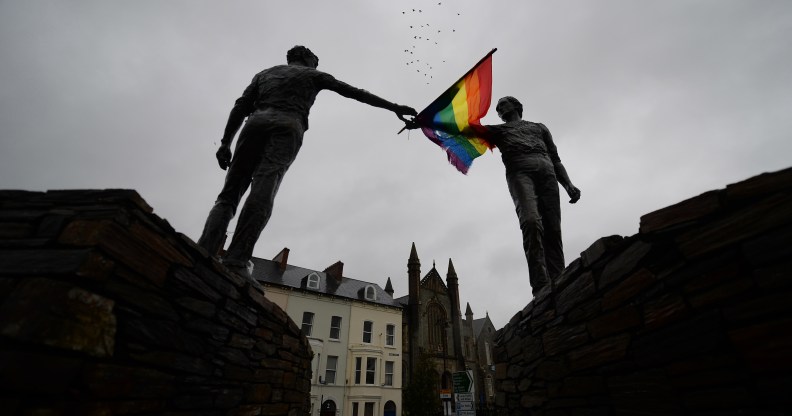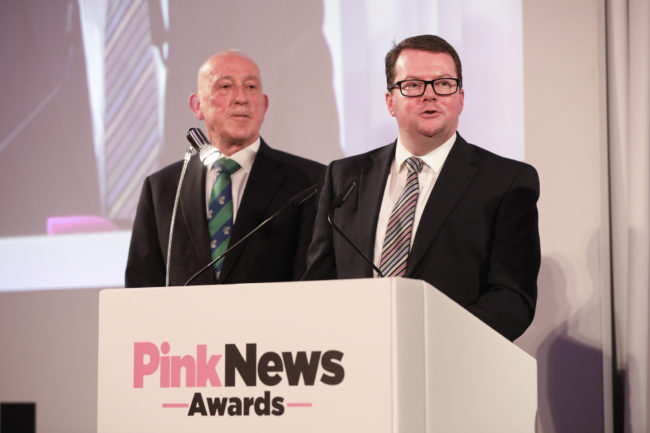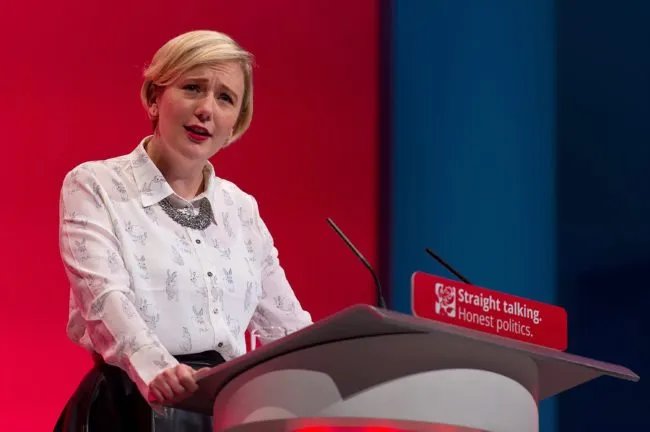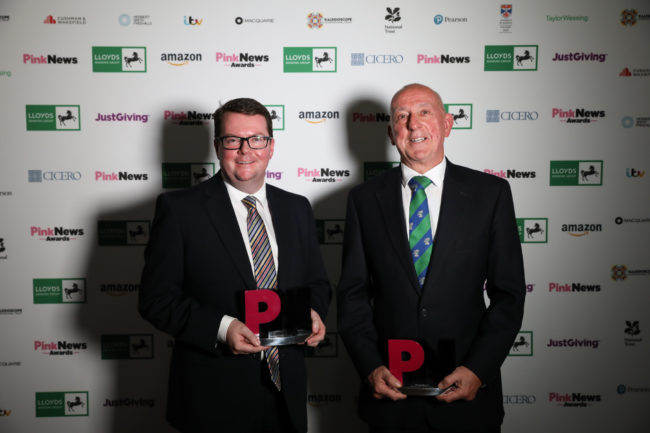Northern Ireland equal marriage plot could force showdown in Parliament this week

A rainbow flag is attached to the ‘Hands across the Divide’ sculpture by artist Maurice Harron near the Irish border on October 9, 2018. (Charles McQuillan/Getty)
A plan that could secure equal marriage in Northern Ireland is set to come to a head in Parliament this week.
Northern Ireland-born Labour MP Conor McGinn, who was last week named PinkNews Politician of the Year for his efforts on the issue, is behind the new plot alongside fellow Labour MP Stella Creasy, who has campaigned for abortion access.
The pair have tabled an amendment to a key government bill that is heading through Parliament intended to extend powers to civil servants in the region in the absence of the devolved power-sharing government.
Titled “Equal rights for people of Northern Ireland,” the amendment would tack on a measure to end the region’s bans on abortion and gay weddings.
With the government rushing the bill through Parliament this week, the amendment could quickly come to a head if it is backed by enough MPs before votes take place on Wednesday (October 24).
There is strong support for equal marriage and abortion access in Northern Ireland among MPs, putting the government’s position in peril if the amendment is selected for a vote.

Conor McGinn MP accepts the Politician of the Year Award at the 2018 PinkNews Awards, alongside Tory peer Lord Hayward (Paul Grace)
Love Equality, the coalition which campaigns for equal marriage rights in Northern Ireland, has given the amendment its blessing.
The campaign group said: “We support this new move by MPs Conor McGinn and Stella Creasy to legalise same-sex marriage in Northern Ireland.
“With no prospect of a return of devolution, we need MPs to end discrimination faced by same-sex couples in NI. Please ask your MP to support.”

Stella Creasy (Ben Pruchnie/Getty)
Creasy said: “We have 48 hours to show Theresa May it’s time to come good on her promise and give MPs chance to vote for equal rights for the people of Northern Ireland. Please ask your MP to join Conor McGinn and I and add their name.”
McGinn told the Guardian: “Every poll shows that equal marriage has the support of the vast majority of people in Northern Ireland, most of the political parties there and the overwhelming number of MPs in the House of Commons.
“Equality for LGBT people in Northern Ireland is long overdue, and this amendment gives the government the opportunity to match its words with deeds and bring Northern Ireland into line with the rest of the UK.”
Progress on both issues has been stalled due to the lack of a devolved government, since the collapse of power-sharing in January 2017.

Conor McGinn MP accepts the Politician of the Year Award at the 2018 PinkNews Awards, alongside Tory peer Lord Hayward (Paul Grace)
In June 2018, the UK Supreme Court found that Northern Ireland’s legal ban on abortion violates human rights standards, but ruled there was no jurisdiction to address the issue.
The plot could cause problems from the government, which is already facing down an amendment on the same bill from rebel Tory MPs seeking to prevent Northern Ireland from remaining in the Customs Union after Brexit.
The government is reliant on Northern Ireland’s Democratic Unionist Party, which is opposed to equal marriage and abortion, to shore up its majority in Parliament. Relations between the two parties are already at breaking point, with the DUP’s MPs planning to vote in favour of the rebel Brexit amendment.
McGinn and Creasy’s amendment explains that “in the absence of Northern Ireland Ministers,” it makes provisions “to address the matters identified by the Supreme Courts in relation to the human rights of the people of Northern Ireland.”
The plan would strike off a line of the Marriage (Northern Ireland) Order 2003, which states that a marriage is invalid in Northern Ireland if “both parties are of the same sex.”
It also scraps criminal offences for “administering drugs or using instruments to procure abortion” and “procuring drugs to cause abortion.”
A government spokesperson told the Guardian: “This legislation is required to provide the Northern Ireland civil service with the certainty and clarity they need to continue to deliver public services in Northern Ireland.
“Amendments will be considered by the Commons in the normal way.”
McGinn’s pre-existing backbench bill on equal marriage in Northern Ireland is also set to come back before Parliament on October 26, though it stands little chance of passing without government support.

